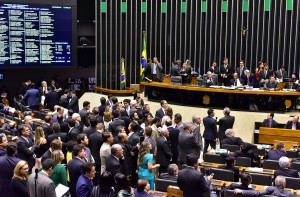For the rapporteur, the project will establish a minimum base of 2% of the ISS and end the fiscal war

Due to the number of highlights and amendments, they will be analyzed next week. The project was approved by 293 votes to 64.
In the presentation of his new substitute, the rapporteur of the matter, deputy Walter Ihoshi (PSD-SP), included three main novelties. One of them is the ISS exemption for services provided by cooperatives to their members and services provided by members through the cooperative.
For the rapporteur, the project will establish a minimum base of 2% of the ISS and end the fiscal war. "We also have to update the list of new services that are not on the current list and, above all, internet services, such as Netflix, which is not taxed", he defended.
Immunity
In order to provide in the infraconstitutional legislation the tax immunity provided for in Constitutional Amendment 75/13, Ihoshi includes a provision on the exemption of ISS in phonograms and music videograms produced in Brazil, whether by Brazilian authors or not.
The general rule of the text, however, prohibits the granting of tax or financial exemptions, incentives and benefits, including reduction of the calculation base or assumed credit. The text considers null a law or act that does not respect this rule.
The text allows some exceptions. Cities will be able to establish exemptions and incentives to the civil construction sectors, their related areas (hydraulic, electrical, well drilling services, excavation, drainage, irrigation, earthworks and paving), and to municipal public transport. The concept of public transport includes the various modes: road, rail, subway and waterway.
The states and the DF will have one year, as of the publication of the future law, to revoke the devices that grant the exemptions. The term is scheduled for the same term, one year after publication.
Administrative dishonesty
The third point included by the rapporteur is the permission for the municipality to have the possibility to take legal action on acts of administrative improbity against the public agent who grants, applies or maintains a financial or tax benefit related to ISS.
In the previous version of the text, this new type of administrative crime was already foreseen. The penalty will be for loss of civil service, suspension of political rights for five to eight years and civil fine of up to three times the amount of the benefit granted.
These changes to Law 8.429 / 92 will also take effect one year after the publication of the future law.
New services
One of the most debated points with the municipalities is the inclusion of new services in the list of those that can be taxed with the ISS. The project includes application of tattoos, piercings and the like; surveillance and monitoring of movable assets; and making audio, video, image and text content available on electronic pages, except for newspapers, books and periodicals.
In all cases of surveillance and monitoring, the tax is levied even when the activity is carried out by means of mobile telephony, transmission by satellites, radios or other means.
In the reforestation sector, several actions are included to specify the concept of similar activities. Among those specified by the project, soil repair, planting, silage, harvesting, cutting and debarking trees and forestry stand out.
Reportage - Eduardo Piovesan
Edition - Sandra Crespo
Source: Chamber of Deputies website (10/09)



